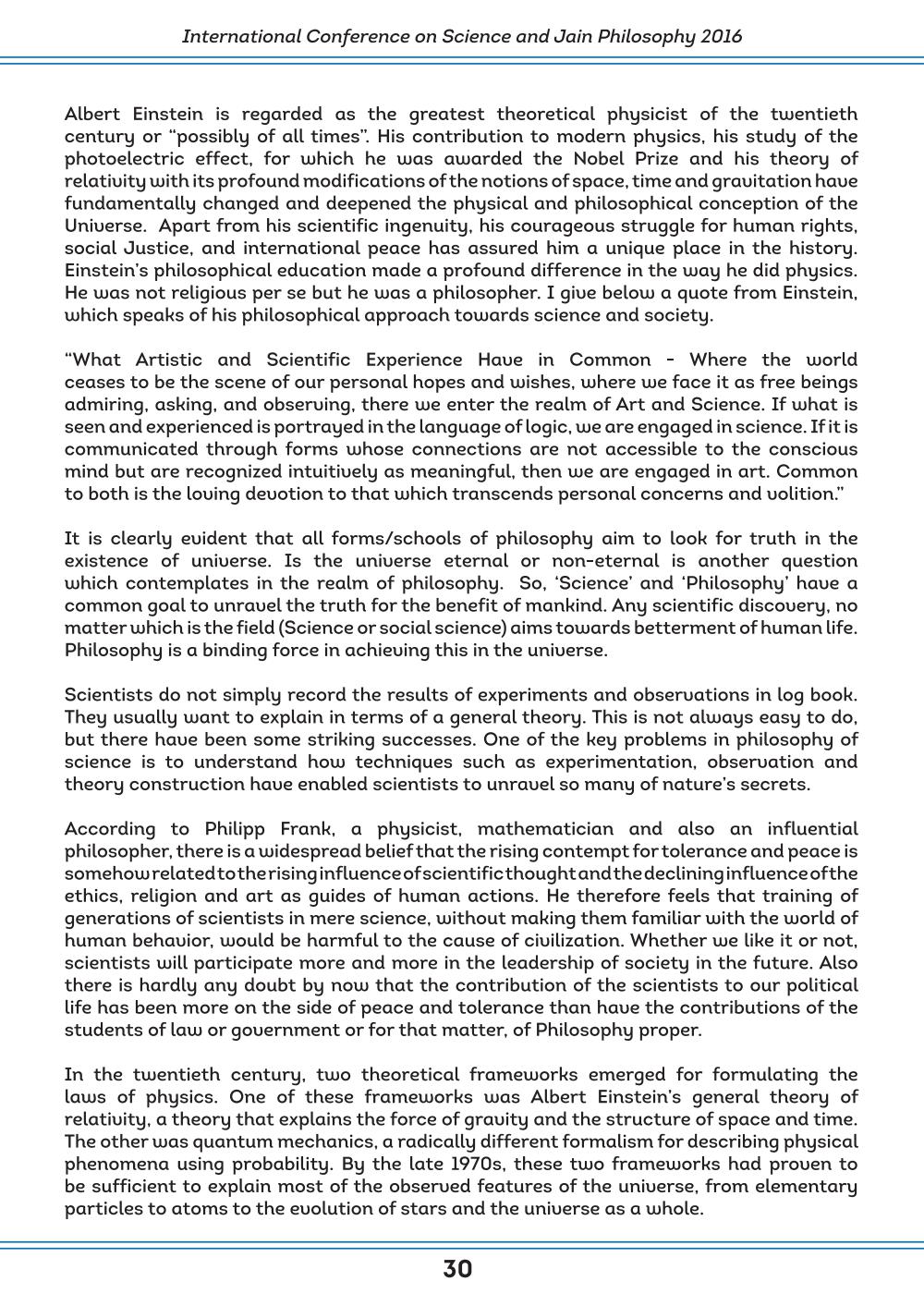________________
International Conference on Science and Jain Philosophy 2016
Albert Einstein is regarded as the greatest theoretical physicist of the twentieth century or "possibly of all times". His contribution to modern physics, his study of the photoelectric effect, for which he was awarded the Nobel Prize and his theory of relativity with its profound modifications of the notions of space, time and gravitation have fundamentally changed and deepened the physical and philosophical conception of the Universe. Apart from his scientific ingenuity, his courageous struggle for human rights, social Justice, and international peace has assured him a unique place in the history. Einstein's philosophical education made a profound difference in the way he did physics. He was not religious per se but he was a philosopher. I give below a quote from Einstein, which speaks of his philosophical approach towards science and society.
"What Artistic and Scientific Experience Have in Common - Where the world ceases to be the scene of our personal hopes and wishes, where we face it as free beings admiring, asking, and obseruing, there we enter the realm of Art and Science. If what is seen and experienced is portrayed in the language of logic, we are engaged in science. If it is communicated through forms whose connections are not accessible to the conscious mind but are recognized intuitively as meaningful, then we are engaged in art. Common to both is the loving devotion to that which transcends personal concerns and volition."
It is clearly evident that all forms/schools of philosophy aim to look for truth in the existence of universe. Is the universe eternal or non-eternal is another question which contemplates in the realm of philosophy. So, 'Science' and 'Philosophy' have a common goal to unravel the truth for the benefit of mankind. Any scientific discovery, no matter which is the field (Science or social science) aims towards betterment of human life. Philosophy is a binding force in achieving this in the universe.
Scientists do not simply record the results of experiments and observations in log book. They usually want to explain in terms of a general theory. This is not always easy to do, but there have been some striking successes. One of the key problems in philosophy of science is to understand how techniques such as experimentation, observation and theory construction have enabled scientists to unravel so many of nature's secrets.
According to Philipp Frank, a physicist, mathematician and also an influential philosopher, there is a widespread belief that the rising contempt for tolerance and peace is somehow related to the risinginfluenceofscientific thought and the declininginfluenceofthe ethics, religion and art as guides of human actions. He therefore feels that training of generations of scientists in mere science, without making them familiar with the world of human behavior, would be harmful to the cause of civilization. Whether we like it or not, scientists will participate more and more in the leadership of society in the future. Also there is hardly any doubt by now that the contribution of the scientists to our political life has been more on the side of peace and tolerance than have the contributions of the students of law or government or for that matter, of Philosophy proper.
In the twentieth century, two theoretical frameworks emerged for formulating the laws of physics. One of these frameworks was Albert Einstein's general theory of relativity, a theory that explains the force of gravity and the structure of space and time. The other was quantum mechanics, a radically different formalism for describing physical phenomena using probability. By the late 1970s, these two frameworks had proven to be sufficient to explain most of the observed features of the universe, from elementary particles to atoms to the evolution of stars and the universe as a whole.
30




